All kids need is a little help, a little hope, a shared smile 😊 and someone to believe in them.
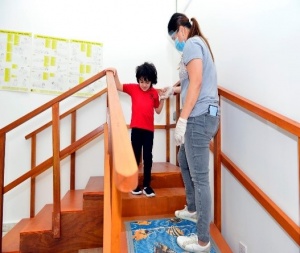 Department of Physical Therapy:
Department of Physical Therapy:
Physiotherapists work with children and young people and their families to optimize physical function. We promote active movement, build strength, develop balance skills, maintain and improve range of movement, flexibility in the joints,prevent contractures, deformities, and pain. We help children and young people develop a repertoire of movements to facilitate standing, stepping, walking and transferring in different environments. We undergo detailed assessments of the child motor function. It includes assessing gross motor milestones, gait analysis, muscle tone, joint range, and patterns of movement. We make bespoke programs of intervention to maximize movement skills and functional mobility. Physiotherapists also advise on postural management, provide post-operative rehabilitation and prescribe adaptive equipment such as wheelchairs, standing frames, and walkers for use in school, at home and in the community.
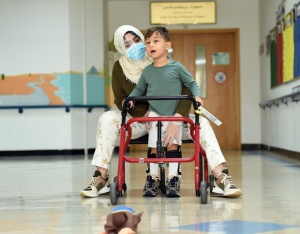
Our Services:
- Conductive education:
Connective Education is an educational program created to teach movement skills. This method is an intensive, multidisciplinary approach designed to enable people of determination with movement disorders to become more functional and independent.
Conductive education is based on the principle of neuroplasticity, the process by which the brain creates new pathways for sending messages to the body, rerouting around damaged paths.These pathways are created through active learning (where challenging tasks, such as walking, are broken down into more achievable parts, such as bearing weight and alternately bending the legs). This program allows people of determination to perform daily activities, such as walking, getting dressed, eating and playing, with greater independence.
- Aquatic Therapy
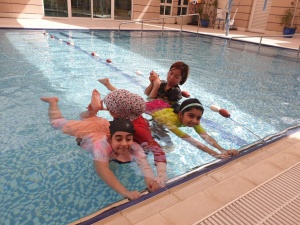
Aquatic therapy is a powerful rehabilitation tool that can enable children with disabilities to reach their land-based goals by using different water-based approached in the form of meaningful funny activities which encourage children self-confidence and enhance their overall physiological status.
During the aquatic session, therapist use the hydrodynamics and thermodynamics principles of the water for effective management of children with musculoskeletal problems, neurological problems, cardiopulmonary problems, and any other conditions helping them to overcome their disabilities
Aquatic therapy intervention with the other therapeutic tools working simultaneously to enhance social-engagement and community participation of children with disabilities.
- Adaptive equipment / assistive devices:
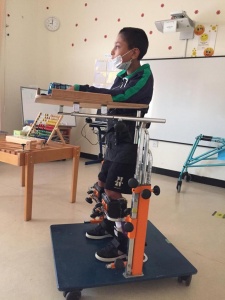
Describing the appropriate tool or device for mobility changes the child’s life and enhances his independence.
This equipment includes: special chairs for sitting at home, wheelchairs, standing frame devices and tools, walkers and splints, etc.
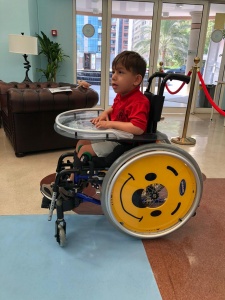
- Hippotherapy:
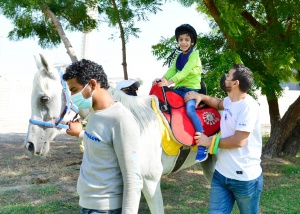
Hippotherapy has been proven to be one of the most efficient and effective treatments to improve posture control, develop sensory integration and balance, improve motor performance, develop the child’s ability to communicate and express his desires and demands, improve respiratory performance, increase attention for children with sensory disorders.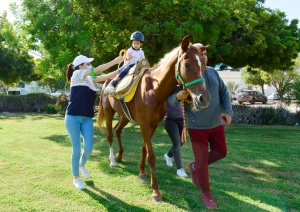
The main goal of Hippotherapy is to improve joint mobility, develop control in head and trunk control and these goals can be reached with Hippotherapy more quickly than in-clinic treatment.
During a therapy session, the therapist continually monitors the child’s adaptive response and adjusts the horse’s movement to provide an appropriate challenge that will support him in achieving his career and life goals.
Each treatment plan is based on the evaluation of the therapists and the child’s functional goals after referring to the framework of the International Classification of Performance in force by the World Health Organization.
The results of the development and improvement of the child are measured by a marked improvement in his performance in carrying out daily functions and during the practice of usual activities inside and outside the home.
- Teletherapy :
The centre gives the opportunity for parents who are not able to come to the center for remote sessions in order to continue implementing the treatment programs for students who need these sessions to reach the desired goals.

